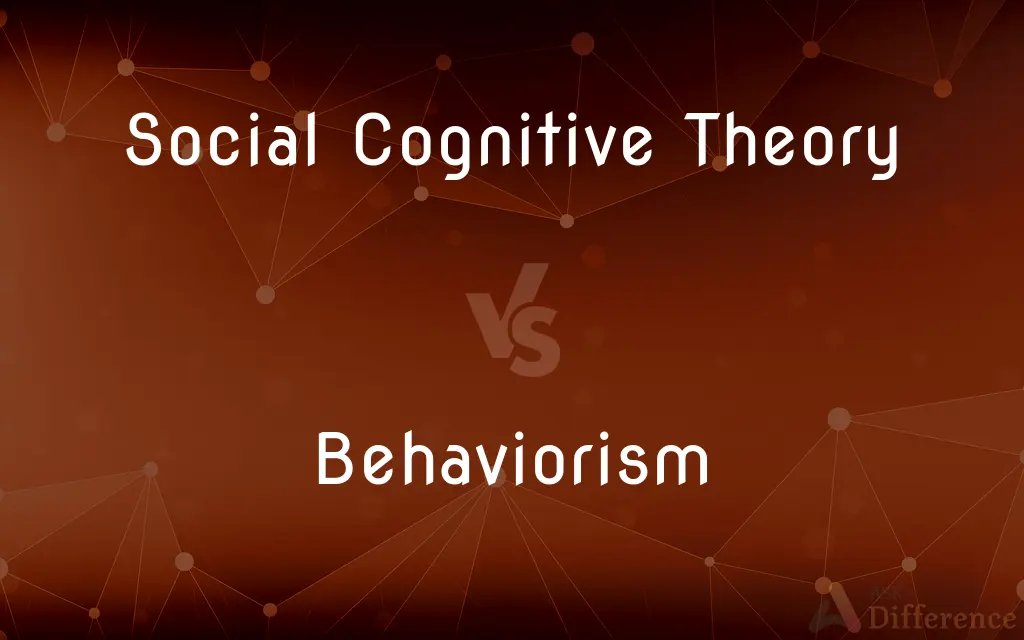Social Cognitive Theory vs. Behaviorism — What's the Difference?
By Tayyaba Rehman & Maham Liaqat — Published on October 26, 2024
Social Cognitive Theory emphasizes learning through observation and the role of cognitive processes, while Behaviorism focuses on observable behaviors and the effects of external stimuli, ignoring mental states.

Difference Between Social Cognitive Theory and Behaviorism
Table of Contents
ADVERTISEMENT
Key Differences
Social Cognitive Theory (SCT) and Behaviorism are two influential theories in psychology that explain human behavior through different lenses. SCT, developed by Albert Bandura, posits that learning occurs in a social context and involves observational learning, imitation, and modeling. It suggests that cognitive processes such as attention, memory, and motivation play a significant role in learning.
Behaviorism, on the other hand, developed by figures like John B. Watson and B.F. Skinner, argues that behavior is a result of environmental stimuli and responses. It emphasizes the study of observable behavior, dismissing internal mental states as irrelevant.
One of the key components of SCT is the concept of self-efficacy, or the belief in one's ability to succeed in specific situations. This concept suggests that people's behaviors are influenced by their confidence in their ability to perform a task. Behaviorism, conversely, does not account for internal beliefs or confidence levels, focusing instead on how external rewards and punishments shape behavior.
SCT acknowledges the role of external environmental factors in influencing behavior but also highlights the importance of internal cognitive processes. It suggests that individuals are not just passive recipients of information but actively interpret and give meaning to the information based on their past experiences. Behaviorism, in contrast, views the environment as the sole determinant of behavior, with little to no emphasis on how individuals process information or their mental states.
Another distinction lies in the methodology of these theories. SCT uses observational studies and experiments that consider cognitive processes to understand how people learn from their environment and others. Behaviorism relies heavily on controlled experiments, often with animals, to observe changes in behavior in response to manipulated environmental conditions.
ADVERTISEMENT
SCT introduces the concept of reciprocal determinism, which posits that human action is influenced by personal factors, the environment, and behavior, all of which interact with each other. Behaviorism, however, maintains a linear perspective, suggesting that behavior is directly caused by external stimuli without any feedback loop involving personal or cognitive factors.
Comparison Chart
Focus
Observational learning, cognitive processes
Observable behavior, external stimuli
Role of Cognition
Central, with emphasis on mental states and processes
Ignored, with focus solely on observable actions
Importance of Environment
Important but interacts with cognition and behavior
Sole determinant of behavior
Concept of Self-efficacy
Fundamental, influences how individuals engage in tasks
Not considered
Methodology
Observational studies, considering internal processes
Controlled experiments, often with animals
Compare with Definitions
Social Cognitive Theory
It emphasizes the role of self-efficacy in learning and behavior.
A student's belief in their math skills improves their performance.
Behaviorism
Behaviorism dismisses the significance of thoughts and emotions in understanding behaviors.
A psychologist studies only the observable responses to stimuli, not feelings.
Social Cognitive Theory
SCT posits that people learn by watching others, incorporating cognitive processes.
A child learns to say please by observing their parents.
Behaviorism
Behaviorism focuses on the study of observable behaviors and external stimuli.
A rat presses a lever to receive food.
Social Cognitive Theory
The theory suggests that cognitive factors mediate in the learning process.
Understanding the consequences of smoking can deter adolescents.
Behaviorism
The theory emphasizes rewards and punishments in shaping behavior.
A dog learns to sit to receive a treat.
Social Cognitive Theory
SCT considers the interaction between individuals, their behavior, and the environment.
A person recycles more after watching friends do so.
Behaviorism
It relies on controlled experiments to study behavioral changes.
Researchers observe pigeons pecking at colored buttons for food rewards.
Social Cognitive Theory
SCT uses observational studies to understand behavioral changes.
Researchers study how peer influence affects teen smoking habits.
Behaviorism
It posits that all behaviors are learned through interaction with the environment.
A child learns to avoid touching a hot stove after being burned.
Behaviorism
A school of psychology that studies observable and quantifiable aspects of behavior and excludes the study of subjective phenomena, such as emotions or motives.
Behaviorism
An approach to psychology focusing on observable behavior which, generally assuming that behavior is determined by the environment and denying any independent significance for mind, largely ignores any pathophysiological processes which may, or may not, underlie subjective, behavioral phenomena.
''Behaviorism is considered by most philosophers of medicine, to be an expression of the weaker, minimalist interpretation of the 'medical model' of clinical psychology because it focuses the study and classification of mental disorders upon a phenomenological, rather than a pathophysiological, approach to the subject.
Behaviorism
An approach to psychology that emphasizes observable measurable behavior.
Behaviorism
An approach to psychology that emphasizes observable measurable behavior
Common Curiosities
Can SCT and Behaviorism be combined in research?
Yes, some research combines elements of both theories to provide a more comprehensive understanding of behavior.
What is the main difference between SCT and Behaviorism?
The main difference lies in SCT's emphasis on cognitive processes and observational learning, whereas Behaviorism focuses on observable behavior and external stimuli.
What role does the environment play in Behaviorism?
In Behaviorism, the environment is seen as the primary determinant of behavior, shaping it through rewards and punishments.
How do SCT and Behaviorism view the role of internal thoughts and feelings?
SCT considers internal thoughts and feelings as important in understanding behavior, while Behaviorism largely ignores them, focusing on observable actions.
How does SCT explain behavior?
SCT explains behavior through a combination of observational learning, cognitive processes, and the interaction between personal factors, behavior, and the environment.
How does observational learning differ from traditional learning?
Observational learning, emphasized in SCT, involves learning by watching others and imitating their actions, unlike traditional learning, which may involve direct instruction or experience.
Can the concepts of SCT be applied in educational settings?
Yes, SCT concepts, especially observational learning and self-efficacy, are widely applied in educational settings to enhance learning and motivation.
How does Behaviorism explain complex human behaviors?
Behaviorism explains complex behaviors as sequences of stimulus-response associations learned over time, though this approach is often criticized for oversimplifying human behavior.
Why is SCT considered more holistic than Behaviorism?
SCT is seen as more holistic because it incorporates not just the environmental factors but also cognitive processes and the reciprocal interaction between different factors influencing behavior.
How do rewards and punishments differ between the theories?
SCT acknowledges the role of rewards and punishments but also considers the cognitive interpretation of these outcomes, whereas Behaviorism focuses directly on how they shape behavior.
Can behavior be predicted by both theories?
Both theories offer models to predict behavior, but their approaches differ, with SCT considering cognitive aspects and Behaviorism focusing on stimulus-response relationships.
Is self-efficacy relevant in Behaviorism?
No, self-efficacy is a concept specific to SCT and is not considered within the framework of Behaviorism.
Are there any modern theories that build on SCT and Behaviorism?
Yes, modern theories like cognitive-behavioral therapy integrate principles from both SCT and Behaviorism, applying them to therapeutic settings.
Do SCT and Behaviorism agree on the nature vs. nurture debate?
Both theories emphasize the role of the environment (nurture) in shaping behavior, but SCT also incorporates personal and cognitive factors, suggesting a more integrated view.
How do the methodologies of SCT and Behaviorism differ?
SCT methodologies often involve observational studies that consider cognitive aspects, while Behaviorism relies on controlled experiments focusing on observable behaviors.
Share Your Discovery

Previous Comparison
Wrinkle vs. Folds
Next Comparison
Blonde Roast vs. Medium RoastAuthor Spotlight
Written by
Tayyaba RehmanTayyaba Rehman is a distinguished writer, currently serving as a primary contributor to askdifference.com. As a researcher in semantics and etymology, Tayyaba's passion for the complexity of languages and their distinctions has found a perfect home on the platform. Tayyaba delves into the intricacies of language, distinguishing between commonly confused words and phrases, thereby providing clarity for readers worldwide.
Co-written by
Maham Liaqat









































